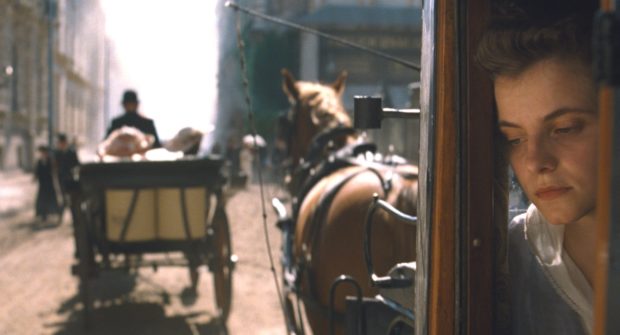
 In 1913 Budapest, a young woman searches relentlessly for the secrets of her own family, in a film that dramatizes a premonition of the old European world’s collapse.
In 1913 Budapest, a young woman searches relentlessly for the secrets of her own family, in a film that dramatizes a premonition of the old European world’s collapse.
How small an individual seems in the modern era—how insignificant seem the hopes and dreams of one person, dwarfed by gigantic events. By the modern era I mean the last century or so. There have been in that century two world wars—the very idea of a world war would have been considered unthinkable earlier—followed by the awful capability of destroying the human race with nuclear weapons, and now the threat of environmental catastrophe. Powerlessness in this case is a symptom of our historical perception. A person lives his or her life as always—but in our awareness of the vast scope of events in modern times we experience this sense of smallness.
Hungarian director László Nemes feels this acutely, and puts a spotlight on it in his latest film, Sunset. As the movie opens, we are in Budapest in 1913, watching a young woman trying on a hat in a milliner’s shop. She seems confused, hesitant. The saleswoman asks her questions, and it comes out finally that the young woman is not a customer, but someone looking for a job there. “Why didn’t you say so?” she’s asked. Then she identifies herself. Her name is Írisz Leiter, and this information changes everything. She’s ushered into an interview with the store’s owner. It turns out the store, a very prominent one is Budapest, is called “Leiter’s” after the original owners, Írisz’s parents, who died in the fire that destroyed the original building, the business having been continued by the owner under the old name. Írisz is an orphan, hoping that she can get a foothold in Budapest by working at the store bearing their name. But the new owner refuses to hire her.
Right from the beginning, as you can tell, the story is shrouded in mystery. Everyone treats her with silence and caution, almost as if she had the plague. The very name of “Leiter” seems to act as a repellent force on whomever she meets. Gradually it becomes evident that she has, or had, a brother—a brother she didn’t know existed. From then on, she seeks, naturally, to find out more about this brother—what did he do that was so terrible; and what happened to him—but all she gets are strange hints and warnings. No matter how much people try to discourage her, she continues her quest to discover the truth, not with a brave spirit of determination, as you might expect, but with a quiet and unassuming persistence, as if she were a sleepwalker, always going forward out of sheer inertia. The journey will take her from the aristocratic world of high society to the darkest realms of poverty and criminal life.
Írisz is played by Juli Jakab, whose delicate features and haunting eyes are at the center of every scene. It’s a mesmerizing performance. Nemes closely follows his main character throughout, while the world around her often seems bewildering and out of focus. Some critics have complained about this style, as if it was just a gimmick, but I think it reflects the director’s vision of life. We are confined to our own point of view as much as a prisoner is confined to a cell. Omniscience is a literary fantasy in which Nemes refuses to indulge. Furthermore, the audience is even more limited than the character, since we don’t know the secrets of her mind or her story, but can only observe what she reveals in words and actions.
Sunset is a film of dread and foreboding. And we sense, beneath the surface of this labyrinth of a tale, an entire society on the verge of collapse. After all, it’s 1913, only a year before the beginning of the war that would shatter the old world forever. The stunning cinematography and impeccable production design evoke, not nostalgia which is what we usually get, but an unnerving premonition of doom. As one character says, referring to the wares at the milliner’s shop, “The horror of the world hides beneath these infinitely pretty things.” It could be a motto for the movie’s unique world view.
As is too often the case for foreign films, Sunset appeared in theaters ever so briefly earlier this year before quickly vanishing. Now, finally, this extraordinary picture is available streaming and on DVD.

